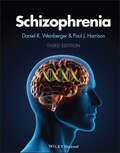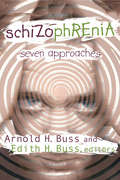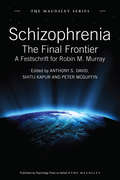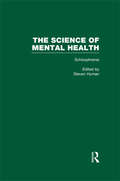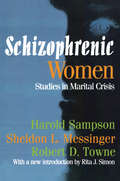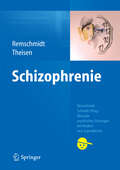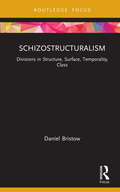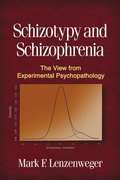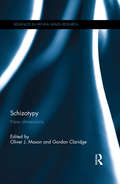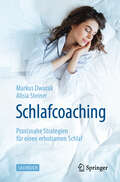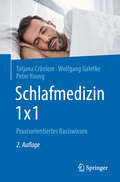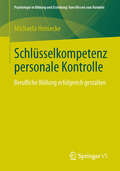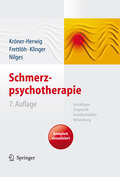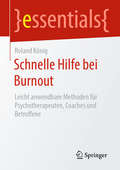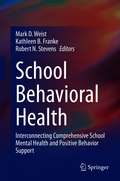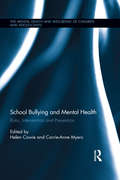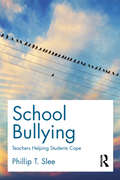- Table View
- List View
Schizophrenia: Progress And Interpretation
by Paul J. HarrisonSchizophrenia is one of the most complex and disabling diseases to affect mankind. Relatively little is known about its nature and its origins, and available treatments are inadequate for most patients. As a result, there are inevitable controversies about what causes it, how to diagnose it, and how best to treat it. However, in the past decade, there has been an explosion of new research, with dramatic discoveries involving genetic etiology and epidemiological risk factors. There has also been a catalog of new drugs coming to market, and controversy about the relative advantages and disadvantages of newer compared with older therapies. In addition, developing technologies in genomics, molecular biology and neuroimaging provide streams of new information. This book represents a definitive, essential, and up-to-date reference text on schizophrenia. It extensively and critically digests and clarifies recent advances and places them within a clinical context. The Editors (one American and one British), highly respected clinical psychiatrists and researchers and acknowledged experts on schizophrenia, have again assembled an outstanding group of contributors from the USA, UK, Europe and Australia, It will be of value to practising psychiatrists and to trainees, as well as to clinical and neuroscience researchers interested in keeping up with this field or coming into it. The book consists of four sections: descriptive aspects, biological aspects, physical treatments, and psychological and social aspects. It reviews the theoretical controversies over symptomatology, classification and aetiology (particularly pertinent as DSM-V is being developed), the relationship of schizophrenia to the other psychoses, the significance of positive and negative symptoms and pre-morbid personality. It describes a variety of approaches to integrating the vast research data about schizophrenia, including neurodevelopmental, genetic, pharmacological, brain imaging and psychological findings. The biological treatment section reviews the comparative efficacy of various drugs, the management of drug-resistant patients and both neurological and metabolic complications. The final section looks at psychological therapies, social outcomes, and the economics of schizophrenia. Highly Commended in the Psychiatry section of the 2012 BMA Book Awards.
Schizophrenia: Seven Approaches
by George WillisonSeven controversial approaches to schizophrenia, each assuming a distinctive model, biological, psychological, or social, are presented by their leading exponents. Arnold and Edith Buss deal with such fundamental issues as: What is the nature of schizophrenia? What general approach does each theory represent? What does each theory assume, what evidence does it require for proof, and what follows if the theory is correct? While the various approaches covered here have many differences and few similarities, they are not all mutually contradictory, and several may be combined into a larger synthesis.From a biological point of view, schizophrenia is a disease like any other, originating in heredity, tissue malformation, and physiological abnormality. The biological approach is represented here by a theory focusing on genetic and neurological aspects. The psychological approach treats schizophrenia as a failure of adjustment. Within this framework there is considerable disagreement. One theory emphasizes the cognitive problems of perceiving, thinking, and problem-solving; another centers on motivational disturbance, with its attendant problems of anxiety and withdrawal; and two theories focus on regressive behavior.Schizophrenia provides a stimulating basis for discussion by presenting the etiology of schizophrenia in terms of the most significant contemporary approaches. The juxtaposition of these viewpoints enables the professor to maximize students' interest as well as their insight into the complexity of contradictory evidence and opinions.
Schizophrenia: The Final Frontier - A Festschrift for Robin M. Murray (Maudsley Series)
by Shitij Kapur Anthony S. David Peter McGuffinSchizophrenia is a unique project reflecting the contribution that Robin M. Murray has made to the field of psychiatry over the past 35 years, with a particular focus on the advances that have been made to the understanding and treatment of schizophrenia. International contributors have been brought together to pay tribute to Robin Murray’s work and explore the latest findings in the area. Sections cover: neurodevelopment neuroscience and pharmacology neuroimaging genetics cognition social psychiatry treatment. This book will be essential reading for psychiatrists, clinical psychologists, social and basic scientists whose work is related to major mental illness, as well as admirers of the work of Robin Murray.
Schizophrenia: The Science of Mental Health
by Steven HymanFirst published in 2002. Routledge is an imprint of Taylor & Francis, an informa company.
Schizophrenic Women: Studies in Marital Crisis
by Harold Sampson Sheldon L. Messinger Robert D. TowneSchizophrenic Women is a fascinating report on the lives of seventeen families that suffered the experiences associated with the hospitalization of the wife and mother for mental illness. A description and analysis of representative experiences is presented here in an attempt to investigate various key issues--the patterns of family living preceding the crisis leading to medical hospitalization; how the patterns fell apart; how personal and family crises became psychiatric emergencies; how the hospital experiences modified both the immediate crises and the earlier patterns of living--and how durable those changes were once the patients had returned home. The book goes beyond the immediate lives of the women and their families--the authors direct attention to patterns of psychiatric care and to the ways in which such crises as those experienced by these women and their families come to professional attention and are managed. The authors explore how help is found and used and some of the functions hospitalization serves for patients and their families. They point out some of the ways that traditional patterns of psychiatric care limit the power to observe, understand, and effectively influence a pathological course of events. In her new introduction to Schizophrenic Women, Rita J. Simon notes that, "Although the study was conducted in the 1950s, readers will recognize its current relevance and importance for scholars and the lay public interested in the problem of mental illness and intrafamily relationships."
Schizophrenie
by Helmut Remschmidt Frank TheisenWohl kaum eine psychische Störung wirft so viele Fragen auf wie die schizophrenen Störungen. Und wohl wenige Störungen können so entscheidend das gesamte Leben beeinflussen. Patienten tragen das Stigma einer Schizophrenie mitunter ein Leben lang mit sich herum. Eine zweifelsfreie Diagnostik und eine adäquate Therapie sind hierbei entscheidend. Helmut Remschmidt und Frank Theisen setzen hier mit ihrem Werk Maßstäbe - Übersichtlich - Praxisrelevant - Handlungsorientiert - Leitlinienkonform Für Kinder- und Jugendpsychiater, psychologische Psychotherapeuten für Kinder und Jugendliche, Pädiater, Pädagogen und alle, die mit jungen Patienten mit psychischen Störungen konfrontiert werden. Die Reihe "Manuale psychischer Störungen im Kindes- und Jugendalter" verfolgt drei wesentliche Ziele: Interdisziplinärer Ansatz: Der Patient steht im Mittelpunkt - der Therapeut muss sein Bestes geben, die Störung zu diagnostizieren und adäquat zu behandeln. Psychiater und Psychologen sind hier gefordert, ihr Wissen beizutragen und über den Tellerrand zu blicken. Praxisrelevanz: Alle Theorie ist grau - diese Reihe gibt Ihnen die Tipps und Tricks an die Hand, mit denen Sie Ihren schwierigen Alltag ein bisschen besser meistern können. Didaktik und Struktur: Alle Bände sind gleich strukturiert und warten mit einer übersichtlichen Didaktik auf. Das Lesen soll Spaß machen und die entscheidenden Informationen müssen schnell erfasst werden können.
Schizostructuralism: Divisions in Structure, Surface, Temporality, Class
by Daniel BristowSchizostructuralism draws together insights from psychoanalytic, structuralist, and Marxist theory, and the divisions and antagonisms that both underpin and distinguish them, to form a new psychoanalytic system. Working through the key concepts and methods in these fields, Daniel Bristow describes the processes of unification and separation inherent in structure; extends concepts within the field of psychoanalytic topology and its study of surface; and interrogates types and phasings of time that operate psychosocially, testing workings of these against analyses of class division and struggle. Returning to and working through key concepts and methods in the fields of structuralism, topology, temporality, and Marxist political theory, Schizostructuralism looks again at such major figures as Freud, Reich, Lacan, Laing, and Deleuze and Guattari—invoking their socially oriented theories and practices—and sets out possibilities for recalibrating critical and clinical approaches to be more politically radical and inclusive. Bristow draws on an array of schematic diagrams, depicting and formulating the clinical categories of neurosis, perversion, and psychosis. Schizostructuralism will be of interest to academics and students of psychoanalytic studies, Lacanian studies, and philosophy. It will also inform psychoanalysts in practice and in training.
Schizotypy and Schizophrenia: The View from Experimental Psychopathology
by Mark LenzenwegerThis compelling book argues that all people with schizophrenia share a personality organization known as schizotypy. Presented is a novel framework for understanding schizophrenia through the study of individuals who may never develop the disorder, but who nonetheless harbor a liability for it. Mark F. Lenzenweger comprehensively reviews current knowledge about schizotypy while exploring broader questions of how to think about and conduct psychopathology research, making the book useful and relevant for both researchers and students. He demonstrates state-of-the-art strategies for combining clinical observations, psychometric and psychophysiological measures, neuroimaging, and genetic analyses, and for analyzing the results using advanced statistical techniques.
Schizotypy: New dimensions (Advances in Mental Health Research)
by Oliver Mason Gordon ClaridgeFor several decades there has been an increasing move towards viewing the psychotic illnesses from a dimensional perspective, seeing them as continuous with healthy functioning. The idea, concentrating mostly on schizophrenia, has generated considerable theoretical debate as well as empirical research, conducted under the rubric of 'schizotypy'. This book offers a timely discussion of the most significant themes and developments in this research area.Divided into four key sections which represent current concerns in schizotypy research – Measurement, Brain and Biology; Development and Environment; Consequences and Outcomes; and Future Directions – chapters reflect a broad range of approaches and discuss varied theoretical perspectives on schizotypy. Topics include: cognitive and perceptual biases psychometric assessments creativity and schizotypy genetic associations. developmental perspectives Schizotypy: New dimensions will appeal to academics, researchers and postgraduate students in the area of psychotic illnesses, as well as professionals including psychiatrists and clinical psychologists who are concerned with the basis of serious mental disorder. The book will inform readers who are new to the topic and will update and expand the knowledge base of those more experienced in the field.
Schlaf, Persönlichkeit und soziales Verhalten
by Zlatan KrižanDas Ziel dieses Buches ist es, einen Überblick über das begrenzte wissenschaftliche Wissen darüber zu geben, wie Schlaf mit Persönlichkeit und Sozialverhalten zusammenhängt. Dieser Sammelband begründet ein neues interdisziplinäres Forschungsfeld zum Thema Schlaf, das Schlafprozesse im Zusammenhang mit sozialem Verhalten und sozial-kognitiven Prozessen (z. B. mögen, respektieren, helfen, verletzen, erreichen) sowie individuellen Unterschieden in der Persönlichkeit (d. h. chronische Muster von Gefühlen, Gedanken und Verhalten) untersucht. Die Autoren zeigen die wichtigsten Lücken in den wissenschaftlichen Erkenntnissen über den Schlaf und seine Bedeutung für persönlichkeitsbezogene und soziale Prozesse auf und wollen damit die künftigen Forschungsbemühungen von Wissenschaftlern aus den Bereichen Psychologie, Biologie, Soziologie und Schlafmedizin unterstützen.Zu den diskutierten Themen gehören:· Wie der Schlaf die Emotionsregulation beeinflusst· Schlaf und Temperament in der frühen Kindheit· Dynamik zwischen Schlaf und Selbstbeherrschung· Auswirkungen auf die Aufgabenerfüllung· Einfluss des Schlafs auf soziale Kognition und Urteilsvermögen'Schlaf, Persönlichkeit und soziales Verhalten' untersucht umfassend die Rolle des Schlafs bei Emotionen und Motivation, die Auswirkungen des Schlafs auf sozial-kognitive Prozesse, die Dynamik zwischen Schlaf und dem Funktionieren von Beziehungen, die Bedeutung des Schlafs für das Gruppenverhalten, die Rolle von Persönlichkeitsunterschieden beim Schlaf und die Rolle des Schlafs bei der Persönlichkeits- und Sozialentwicklung. Forscher aus den Bereichen Persönlichkeits- und Sozialpsychologie, Gesundheitspsychologie und Neurologie werden in diesem aufschlussreichen Buch die erheblichen Lücken im wissenschaftlichen Verständnis des Schlafs aufdecken.
Schlafcoaching: Praxisnahe Strategien für einen erholsamen Schlaf
by Markus Dworak Alisia SteinerWir schlafen 1/3 unseres Lebens – und das aus gutem Grund. Der Schlaf ist die zentrale Erholungsperiode für Körper und Geist und damit eine wichtige Voraussetzung für die Gesundheit und das Wohlbefinden. Im heutigen (Berufs-)Alltag, der sich zunehmend durch Stress, Bewegungsmangel, ungesunde Ernährung und digitalen Medienkonsum auszeichnet, kommt der Schlaf häufig zu kurz. Immer mehr Menschen leiden unter Schlafstörungen und haben verlernt, wie sie einen gesunden Schlaf finden. Ein professionelles Schlafcoaching kann für viele Menschen der Schlüssel zurück zu einem erholsamen Schlaf und einem gesünderen Alltag sein. Dieses Buch vereint aktuelles fundiertes Wissen aus der Schlafforschung mit direkten praktischen Empfehlungen und Tipps für ein ganzheitliches Schlafcoaching. Neben grundlegenden Einblicken in die Funktions- und Wirkungsweise des Schlafs wird auf zahlreiche Einflussfaktoren eingegangen, die den Schlaf fördern oder stören können, wie z. B. körperliche Aktivität, Ernährungsgewohnheiten, Medienkonsum und Abendroutinen. Mit anschaulichen Beispielen, praxisnahen Empfehlungen und Tipps zur Gestaltung der eigenen Coachingtätigkeit, die dabei helfen, als Schlafcoach durchzustarten und ein erfolgreiches Schlafcoaching in der Praxis zu etablieren.
Schlafmedizin 1x1: Praxisorientiertes Basiswissen
by Peter Young Tatjana Crönlein Wolfgang GaletkeLeitlinienorientiert und basierend auf den neuesten Standards der Schlafmedizin: Diagnostische und therapeutische Hilfen bei allen Formen von Schlafstörungen. Praxisnah und übersichtlich von einem interdisziplinären renommierten Autorenteam der Schlafmedizin. Das Wichtigste zum schnellen Nachschlagen für die Praxis.Gestörter Schlaf und Tagesmüdigkeit sind häufige Beschwerden in der ärztlichen Praxis. Unbehandelt bergen sie ein erhöhtes Risiko für Unfälle und kardiovaskuläre Erkrankungen. Das gezielte Erkennen von Schlafstörungen wie die Insomnie, das Schlafapnoe-Syndrom, Parasomnien oder Hypersomnien gehört inzwischen zum Alltag der ärztlichen Praxis. Die Schlafmedizin bietet eine Bandbreite an diagnostischen Verfahren über das Schlaflabor hinaus und störungsspezifische Therapiemöglichkeiten. Guter Schlaf ist ein integrativer Bestandteil der psychischen und körperlichen Gesundheit. Mit Informationsmaterial für Patienten, Fragebögen, Fallbeispielen.
Schlafstörungen
by Brigitte Holzinger Gerhard KlöschDieses Buch vermittelt Basiswissen zu Schlafcoaching, einem integrativen psychotherapeutischen Ansatz zur nichtmedikamentösen Behandlung von Schlafproblemen. Dargestellt werden Grundlagen der Schlaf- und Traumforschung sowie die wichtigsten Schlafstörungen und deren Behandlungsmöglichkeiten. Der inhaltliche Schwerpunkt liegt bei der Planung und Durchführung von psychologischen Behandlungskonzepten bei Schlafstörungen (Schlafedukation, Elemente der kognitiv-behavioralen Therapie, Gestalt- und Hypnotherapie, Gesprächsführung und Albtraumbewältigung).Geschrieben für Psychotherapeuten, Gesundheitsberater, Psychologen, Ärzte, Pflegewissenschaftler, biomedizinische Fachkräfte. Inhaltlich ist das Buch abgestimmt auf den postgraduellen Zertifikatskurs Schlafcoaching an der Medizinischen Universität Wien.
Schlafstörungen ganzheitlich behandeln: Komplementäres Therapiekonzept für Ärzte und Psychotherapeuten
by Carolin Marx-DickDas Buch vermittelt übersichtlich ein vollständiges ganzheitliches Therapiekonzept zur Behandlung von Schlafstörungen und führt damit das Vorgängerwerk "Nichtorganische Schlafstörungen" der Autorin inhaltlich und methodisch weiter. Ausgehend von der Wissensvermittlung zu den Funktionen des Schlafes und evidenten Folgen von Schlafstörungen, beschreibt Carolin Marx-Dick die multimodale Behandlung im Sinne der Mind-Body-Medizin mithilfe von kompakten und praxiserprobten Handlungsanweisungen, u.a. mit achtsamkeitsbasierten Therapietechniken, körpertherapeutischen Elementen, Ernährungs- und Bewegungstherapie und naturheilkundlichen Behandlungsansätzen. Zum Download werden Arbeits- und Patientenmaterialien zur Verfügung gestellt, die eine unkomplizierte und kurzfristige Anwendung der Therapiemethoden ermöglichen. Übersichtstabellen geben den Behandelnden eine schnelle Orientierung zur Diagnostik, Therapieplanung und Einsatz gezielter Therapiebausteine. Alle vorgestellten Methoden haben sich in der Behandlungspraxis bewährt und können Patienten in die Lage versetzen, ihre Gesundheit dauerhaft aufrecht zu erhalten.
Schlüsselkompetenz personale Kontrolle: Berufliche Bildung erfolgreich gestalten
by Michaela HeineckeUnternehmen und ihre Mitarbeiter schauen heute hoffnungsvoll auf Schlüsselkompetenzen. Die Fähigkeit, sich weiterzuentwickeln, ist ausschlaggebend für den Erfolg ganzer Volkswirtschaften geworden. Was können Personalentwickler und Bildungsverantwortliche in der Aus-, Fort- und Weiterbildung dafür tun? Personale Kontrolle ist die Schlüsselkompetenz, die den Zugang schafft. Handlungsnah, ökonomisch und doch auf alle Lebensbereiche übertragbar, hilft Personale Kontrolle nicht nur beim Erreichen von Unternehmens- und Karrierezielen. Sie reguliert das selbständige Lernen im Alltag, beim Blended Learning und auch in Krisenzeiten. Empirische Studien zeigen außerdem: Wer personale Kontrolle gezielt fördert, der eröffnet den Weg in eine Erfolgsspirale des Lernens.
Schmerz sucht Ursache: Neue Wege in der Schmerztherapie – mit Therapieempfehlungen und begleitenden Übungen
by Jutta RichterSie leiden an chronischen Schmerzen und möchten verstehen, woher diese kommen und was Sie dagegen tun können? Blicken Sie hinter das Offensichtliche und erfahren Sie, wie die Entwicklungen in der Kindheit, familiäre Beziehungen, generationsübergreifende und traumatische Erfahrungen körperliche Schmerzen verstärken, aufrechterhalten und sogar verursachen können. Lesen Sie, welche Therapiekonzepte aus Hypnotherapie, Trauma- und systemischer Therapie, aus psychodynamisch und körperorientierten Konzepten erfolgsversprechend sind und was Sie selbst tun können, um Ihre Schmerzen erfolgreich zu reduzieren. Ein wertvoller Ratgeber für Betroffene, aber auch Ärzte und Therapeuten, die moderne Forschungsergebnisse aus der Traumaforschung, der psychosomatischen Medizin und Epigenetik in ihre tägliche Arbeit integrieren möchten.
Schmerzen verlernen: Die erfolgreichen Techniken und Übungen der psychologischen Schmerzbewältigung
by Jutta RichterDas vorliegende Buch zeigt konkrete Techniken und Übungen der psychologischen Schmerzbewältigung, mit denen es gelingt, die Schmerzen dauerhaft zu reduzieren. Es wendet sich an alle Schmerzpatienten, die Schmerzen aktiv bewältigen wollen und an alle Therapeuten und Ärzte, die ihre Patienten dabei unterstützen möchten. Die über 30 erfolgreichen Techniken und Übungen, wie Achtsamkeitsübungen, Entspannungstechniken oder Hypnoseverfahren, lassen sich ohne Arzt oder Therapeut alleine zu Hause anwenden. Jede Übung wird schrittweise und einfach erklärt, ist wissenschaftlich anerkannt, ohne Nebenwirkungen und unabhängig von Schmerzursache oder Ort des Schmerzes wirksam. Auch zahlreiche Hintergrundinformationen zur Schmerzentstehung und zahlreiche Tipps aus der Praxis liefert das Buch. Die 4. Auflage erscheint komplett aktualisiert.
Schmerzen verlernen: Die erfolgreichen Techniken und Übungen der psychologischen Schmerzbewältigung
by Jutta RichterDas vorliegende Buch zeigt konkrete Techniken und Übungen der psychologischen Schmerzbewältigung, mit denen es gelingt, die Schmerzen dauerhaft zu reduzieren. Es richtet sich an alle Schmerzpatientinnen und Schmerzpatienten, die ihre Schmerzen aktiv bewältigen wollen und an alle Therapeutinnen und Therapeuten sowie Ärztinnen und Ärzte, die Betroffene dabei unterstützen möchten. Die über 30 erfolgreichen Techniken und Übungen, wie Achtsamkeitsübungen, Entspannungstechniken oder Hypnoseverfahren, lassen sich ohne ärztliche oder therapeutische Hilfe allein zu Hause anwenden. Jede Übung wird schrittweise und einfach erklärt, ist wissenschaftlich anerkannt, ohne Nebenwirkungen und unabhängig von Schmerzursache oder Ort des Schmerzes wirksam. Auch zahlreiche Hintergrundinformationen zur Schmerzentstehung und zahlreiche Tipps aus der Praxis liefert das Buch. Die 5. Auflage erscheint komplett aktualisiert.
Schmerzpsychotherapie
by Regine Klinger Birgit Kröner-Herwig Jule Frettlöh Paul NilgesDer Band liefert Psychologen und Ärzten das Grundlagen- und Praxiswissen der Schmerz-Psychotherapie und beinhaltet das Pflichtwissen zur Erlangung des Zertifikats "Psychologische Schmerztherapie". In Kurzeinführungen und Fallbeispielen werden die psychodynamischen und verhaltensmedizinischen Grundlagen, psychologische Verfahren der Schmerztherapie, Chronifizierung sowie Schmerzanamnese und Schmerzdiagnostik erläutert. Die 7. Auflage wurde durchgehend aktualisiert und erweitert. Empfohlen von den medizinischen Fachgesellschaften DGSS und DGPSF.
Schnelle Hilfe bei Burnout: Leicht anwendbare Methoden für Psychotherapeuten, Coaches und Betroffene (essentials)
by Roland KönigEs gibt viele Bücher über Burnout, aber nur wenige mit konkreten Anleitungen, wie Sie wieder zurück in Ihre Kraft finden. Dieses essential wurde für all jene geschrieben, die sich leicht verständliche Methoden wünschen, um ihren Klienten oder sich selbst aus dem Burnout zu helfen. Der Fokus wird hierbei auf eine rasche Beseitigung von Erschöpfungs- und Depressionssymptomen gelegt. Die beschriebenen Methoden helfen den Betroffenen, sich schnell aus ihrem Leidensdruck zu befreien und sich wieder allgemein leichter und glücklicher zu fühlen. Als Therapeut ist es immer von Vorteil, auf einen themenspezifischen Methodenpool zurückgreifen zu können. Vor allem dann, wenn es um die unmittelbare Linderung des Leidensdrucks und die Befreiung von Symptomen geht.
School Behavioral Health: Interconnecting Comprehensive School Mental Health and Positive Behavior Support
by Mark D. Weist Kathleen B. Franke Robert N. StevensThis book examines the prevalence of emotional and behavioral problems in youth and the implications of little or low-quality mental health services available for them. It describes aspects of Positive Behavioral Interventions and Supports (PBIS) and school mental health (SMH) that work together to form a comprehensive service delivery model called the Interconnected Systems Framework (ISF). The term school behavioral health (SBH) is used to describe SMH and PBIS working together, as in the ISF. The book examines perspectives of key stakeholders through a series of research forums, during which participants identified critical themes for the advancement of SBH in South Carolina and the southeast region of the United States. Chapters address key themes of school behavioral health from these forums, such as collaboration, schoolwide approaches, quality of services, and support for specific populations, including military families and youth involved in the juvenile justice and child welfare systems. The book addresses barriers to providing behavioral health services at school as well as recommendations from key stakeholders for advancing SBH along these critical dimensions. This volume is a must-have resource for researchers, professors, and graduate students as well as practitioners, clinicians, and therapists across such interrelated disciplines as clinical child and school psychology, educational policy and politics, social work, public health, school counseling, family studies, juvenile justice, child and adolescent psychiatry, and child welfare and well-being services.
School Bullying and Marginalisation: Harmonising Paradigms
by Phillip T. Slee Rosalyn H. ShuteThis book addresses, and seeks to harmonise, different paradigms for understanding school bullying. It sets out to examine two paradigms for conceptualising bullying, and the worldviews that underpin them. It uses a complex systems perspective to bring the two paradigms together in a holistic fashion. By doing so, it creates an integrated framework for conceptualising the many individual, relational and societal factors that are in dynamic interaction and play a part in promoting or reducing school bullying. This book draws upon a number of disciplines by way of background, including evolutionary, child development and social psychological theories of group behaviour and identity. It proposes that the human need for belonging is central to understanding bullying, and situates the topic within an understanding of gender and children’s human rights, bringing philosophical and moral perspectives to bear. It discusses practical ways forward, presents a systemic approach to bullying and application of complex adaptive systems methods to bullying research and evaluation. It serves as an introduction to such methods and suggests further creative ideas for policy, intervention practice, and teacher education about bullying.
School Bullying and Mental Health: Risks, intervention and prevention (The Mental Health and Well-being of Children and Adolescents)
by Helen Cowie Carrie Anne MyersBullying amongst young people is a serious and pervasive problem, and recent rapid advances in electronic communication technologies have provided even more tools for bullies to exploit. School Bullying and Mental Health collates current research evidence and theoretical perspectives about school bullying in one comprehensive volume, identifying the nature and extent of bullying and cyberbullying at school, as well as its impact on children and young people’s emotional health and well-being. There are many negative consequences of bullying, and children and young people who have been victimised often suffer long-term psychological problems, such as increased levels of anxiety, depressive symptoms, social isolation, loneliness and suicidal ideation. Perpetrators of bullying also have a heightened risk of experiencing problems such as anxiety and depression, as well as eating disorders and antisocial behaviour. Founded on rigorous academic research, this important book tackles the negative consequences of bullying, and bullying culture itself, by examining the social and cultural contexts that perpetuate such behaviour from childhood through adolescence and potentially into adulthood. Containing contributions from an international team of authors, this book explores current interventions to prevent and reduce school bullying and to alleviate its negative effects on the mental health of children and young people. In-depth discussion of the profound implications of this research for researchers, practitioners and policymakers makes this book essential reading for those interested in bullying culture and the mental health and well-being of children and adolescents.
School Bullying and The Legacy of Dan Olweus
by Peter K. Smith Susan P. Limber Vasiliki Artinopoulou Kyrre BreivikThe intellectual and personal history of the late Dan Olweus, a pioneer in the field of bullying management and prevention School Bullying and the Legacy of Dan Olweus honours the work and legacy of Dan Olweus, a man generally seen as the “founding father” in the field of bullying management and prevention who initiated a shift in how society, educators, parents and professionals handle and keep track of the hostility that some children display. This book explores how Olweus developed the first widely used questionnaire to survey the issue of bullying and victimisation (the Olweus Bullying Questionnaire, or OBQ), was instrumental in designing the first intervention campaign against school bullying in Norway in the 1980s and developed a multi-layered program of intervention, the Olweus Bullying Prevention Program (OBPP), which is used in many countries around the world. This book also provides constructive criticisms of his work, as well as ways to build on his legacy to reduce the impact of bullying on children and young people. Delivering a summative view of his contribution to this research area, School Bullying and the Legacy of Dan Olweus discusses topics including: Olweus' research and practical achievements over three main stages: first in Sweden, then in Norway and then in later years Uses, strengths and limitations of the OBQ and OBPP, the views of Olweus on cyberbullying and his influence in Japan and China The definition of bullying, bias-based bullying and research challenges around the assessment of interventions The view of the school as a complex adaptive system and the contribution of civil society and of laws and policies against bullying Providing an expansive intellectual and personal history of a leader in the field, School Bullying and the Legacy of Dan Olweus is an essential read for all parents, educators, administrators, researchers and professionals seeking to understand and prevent bullying in schools around the world.
School Bullying: Teachers helping students cope (Positive Education Ser.)
by Phillip SleeTo effectively cope with school bullying it is essential to understand the issues underpinning student peer group dynamics in the school, classroom and community and this view lies at the heart of the text. While the experience of bullying others or being victimized is identified with an individual or group the solution lies with the systems eg community, school, classroom or family of which the individual is part. Particular emphasis is given to the role of prosocial behavior and a strengths based perspective in addressing how students cope with school bullying within a systemic context. The text is strongly informed by the author’s experience in developing and conducting national and international school-based anti-bullying and mental health interventions. The book advocates a systems based approach to addressing school bullying as illustrated with a program developed and evaluated by the author called the ‘P.E.A.C.E. Pack: A program for reducing bullying in schools’. This book translates research into practice with a strong evidence-based application drawing on an extensive data base. Each chapter contains practical information and research on school/classroom/community applications, trends and issues in the field and practical ideas for implementing anti-bullying measures. The first two sections consider ways to promote positive peer relations in schools and the dynamics of peer groups. Consideration is then given to cyber bullying and to theories explaining violence, aggression and bullying. Later sections examine the nature and effects of bullying, from early childhood through to adolescence on vulnerable groups, including students with special educational needs and disabilities and LGBTQ young people. The book details information for schools and teachers on ways to collect data and information to inform the interventions and policies of their school. School and classroom based resources for teachers, counsellors and administrators are identified. With school bullying now a matter of international concern not only to children, young people and their caregivers, but to schools and teachers at the forefront, this book will be important reading for all students in psychology, education, health and social welfare, as well as school administrators, teachers, counsellors and childcare professionals.
